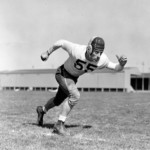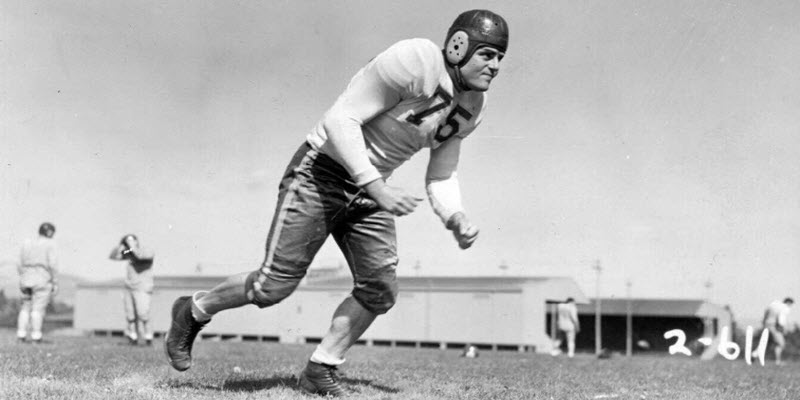“A day that will live in infamy.”
President Franklin D. Roosevelt spoke those words to the United States Congress Dec. 8, 1941, a day after the Japanese surprised the world with their attack on Pearl Harbor just the day before. Of course this had great consequences throughout the country and the world, but on the Oregon campus, it would dramatically change Duck football for the 1942, 1943, and 1944 seasons. Oregon managed to barely field a team for the 1942 season, and perhaps they should have canceled that season as they lost so many key players to the war effort. The Men of Oregon were truly going to battlefields of WWII!
The Ducks closed out its 1941 season with a game against the University of Texas at Austin, as the Longhorns were called at the time and the Ducks were beaten by Texas 71-7. The 71 points scored by Texas represent the most points ever scored against an Oregon football team while only the 1974 loss to Washington and the 1972 loss to Oklahoma were by larger margins.

Peter Torchia
Despite the humiliating loss to Texas there was optimism on the part of Oregon supporters that the 1942 team would be much better as the team originally was going to return most of its key players. The Ducks could look forward to the opportunity to get revenge on the Longhorns in a return visit from Texas to open the 1943 season. However, the Ducks just happened to return home to Eugene on that very infamous day and they learned of the Japanese attack on Pearl Harbor. The landscape of college football was about to change drastically not just for Oregon, but for all of college football. There would be no return visit from Texas until 1947!
Players with eligibility remaining for the 1942 season began departing for the military. These players included guard Morris Jackson, centers Herschel Patton, Don O’Neil and Elliott Wilson, end Bill Borcher, fullbacks Bob Koch and Bill Dunlap, halfbacks Clyde Lee and Jim Newquist, and tackle Pat Wynne.
Quarterback Bob Donnelly was drafted shortly before the 1942 season, and end Tony Crish would go to work in the war industries in Portland. This loss of talent, particularly Koch and Newquist would result in Oregon being projected to finish near the bottom of the Pacific Coast Conference.
The United States Armed Forces encouraged colleges and universities to continue their varsity sports, particularly team sports as a way to prepare men for combat duty, while at the same time taking many of those student-athletes into the military.The demands of the war were about to impose restrictions on college football other than siphoning off players.

Bob Reynolds was a standout RB at Oregon in 1942, and again after WWII in 1945, 46
Gasoline rationing was implemented as well as limits on tires. Railroad travel was often restricted because of the military’s use of the railroads to move troops and supplies. These restrictions would make it much more difficult for teams to travel as well as fans to get to the games. Many contests were being played in larger cities, such as Portland and such restrictions resulted in a significant loss of revenue to the athletic departments of most universities and attendance would plummet like the current Husky fan base’s hopes.
Given the loss of talent, Oregon along with most of the smaller schools in the conference, advocated for freshman to be eligible for varsity competition. Freshman eligibility was opposed by the larger schools in the Conference because they typically had larger rosters. In March 1942, the faculty advisers of the PCC declined to adopt a rule allowing freshman to play on the varsity.
Whoops.
Not only did the Ducks lose key players, they lost most of the coaching staff as well. The Ducks opened spring practice in 1942 with just 44 players reporting for practice. Tex Oliver was the head coach at the opening of practices, but left shortly after to become the head coach of the St. Mary’s Naval Pre-Flight Air Devils at St. Mary’s College in California.
Vaughn Corley, an assistant coach took over coaching duties for a few days. Then Corley left to join Oliver at St. Mary’s. The head coaching position remained open briefly. Among the candidates considered for the job were Claude “Tiny” Thornhill , former Stanford coach, and Jim Thorpe.

Coach John Warren
Yes, THAT Jim Thorpe, the greatest athlete of the 20th Century was considered to be the head coach in Eugene.
But for reasons only the athletic department at the time knows, the job would be given to John Warren who had served the previous six seasons as head freshman football, basketball, and baseball coach. Warren would be assisted by Manny Vezie, one of Oliver’s assistants, and Ray Segale, who finished his playing career at Oregon in 1941. Anson Cornell, Oregon’s graduate manager (athletic director), would take over as freshman coach.
But Oliver was not done with his poaching of Oregon staff. He later took Oregon’s trainer, Bob “Two-Gun” Officer, and equipment manager, Don Shreve to add to his staff at St. Mary’s. When Oregon opened its fall camp in 1942, the primary question would be who would fill the center, quarterback/blocking back, and fullback positions. There was a lack of returning letter winners at those positions because of graduation and players joining the military. The line was considered one of the best on the Pacific Coast before the War.
But after? Not so much. Sophomores would end up filling most of the vacancies because of injuries during the season.
Before fall practices opened, the PCC limited travel squads to 28 players, except for games in which the teams were located within 50 miles of each other, because of transportation issues. There were also rules about how a game would be decided if there was an air raid, and a certain amount of funds to go to Army-Navy relief. Oregon’s game with the St. Mary’s Gaels, not to be confused with the Air Devils, the other football team on the St. Mary’s campus, was canceled.
As it turned out, ironically, the Ducks’ opening game of the 1942 season was against the St. Mary’s Navy Pre-Flight Air Devils, sometimes referred to as the Sailor Saints, coached by Oliver. The Air Devils were considered among the top teams on the West Coast. Their roster was made up of players who had been college and pro stars. It included five former teammates (Newquist, Koch, Jackson, Dunlap, and Lee).
The Air Devils were heavily favored. However, Oregon played inspired football for the entire 60 minutes, only going down 10-9 on a last minute field goal.

Ed Moshofsky
With the exception of a blowout win over Idaho and an upset of UCLA, the eventual PCC champion, Oregon’s season was pretty dismal with the Ducks ending with embarrassing losses to USC and Oregon State, finishing 2-6. The 1942 season was a disappointment mostly because of player losses to the military and a string of crucial injuries over the course of the season, which they obviously they could not have afforded.
Interestingly, both of Oregon’s victories came in the only two games played in Eugene. In December 1942, the PCC decided to allow freshmen to play varsity sports. What impact, if any, would that decision have on Oregon football in 1943?
That will be examined in an upcoming article.
Jim Maloney
Ellensburg, Washington
Top Photo of Chuck Elliot from UO Libraries, Special Collections
Related Articles:
Jim currently resides in Ellensburg, Washington where he has had the opportunity to watch former Ducks such as NaDerris Ward and Scott Grady play for Central Washington University, Jim’s alma mater. However, Jim was born in Eugene and attended Howard Elementary School, and what then called Colin Kelly Junior High School before moving to Washington. Jim began following the Ducks during the 1957 season and had the opportunity to watch a number of games at Hayward Field. Over the years, Jim has developed a wealth of knowledge about Oregon sports history. When not editing on Fanbase.com or working in his garden, Jim manages to find time to practice law.

